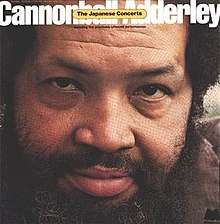The Japanese Concerts
The Japanese Concerts is a live album by jazz saxophonist Cannonball Adderley recorded at the Kosei-nenkin Kaikan and Sankei Hall in Tokyo during his 1963 Japanese tour and featuring performances by Adderley with Nat Adderley, Yusef Lateef, Joe Zawinul, Sam Jones and Louis Hayes.[1] The album was released on the Milestone label in 1975 and combines material previously released on Adderley's Nippon Soul (1963) with an additional disc of unreleased performances from a concert recorded a week earlier.[1]
| The Japanese Concerts | ||||
|---|---|---|---|---|
 | ||||
| Compilation album by | ||||
| Released | 1975 | |||
| Recorded | July 9, 14 & 15 1963 | |||
| Genre | Jazz | |||
| Label | Milestone | |||
| Cannonball Adderley chronology | ||||
| ||||
Reception
The Allmusic review by Scott Yanow awarded the album 4½ stars and states "Cannonball Adderley's finest group is heard at the peak of their powers on this two-LP set... these musicians were very familiar with each other's playing and they had grown together. The enthusiastic Japanese crowds inspired the all-star band to some of their most rewarding playing... It's a definitive portrait of a classic group".[2]
| Review scores | |
|---|---|
| Source | Rating |
| Allmusic | |
| The Rolling Stone Jazz Record Guide | |
Track listing
- Side One:
- "Nippon Soul (Nihon No Soul)" (Julian "Cannonball" Adderley) - 9:34
- "Easy to Love" (Cole Porter) - 3:49
- "The Weaver" (Yusef Lateef) - 10:50
- Side Two:
- "Tengo Tango" (Julian "Cannonball" Adderley, Nat Adderley) - 2:40
- "Come Sunday" (Duke Ellington) - 7:03
- "Brother John" (Lateef) - 13:03
- Side Three:
- 'Work Song" (Nat Adderley) - 9:06
- "Autumn Leaves" (Joseph Kosma, Jacques Prévert) - 7:27
- "Dizzy's Business" (Ernie Wilkins) - 6:01
- Side Four:
- "Primitivo" (J. Adderley) - 12:12
- "Jive Samba" (N. Adderley) - 10:37
- Recorded at Koseinenkin Kaikan in Tokyo, Japan on July 9 (Sides Three, tracks 1 & 3 and Side Four, track 2), and Sankei Hall in Tokyo, Japan on July 14 (Side One, tracks 2 & 3 and Side Three, track 2) and 15 (Side One track 1 and Side Two and Side Four, track 2), 1963
Personnel
- Cannonball Adderley - alto saxophone
- Nat Adderley - cornet
- Yusef Lateef - tenor saxophone, flute, oboe
- Joe Zawinul - piano
- Sam Jones - bass
- Louis Hayes - drums
References
- Cannonball Adderley discography accessed 21 October 2009
- Yanow, S. Allmusic Review accessed 21 October 2009
- Swenson, J., ed. (1985). The Rolling Stone Jazz Record Guide. USA: Random House/Rolling Stone. p. 5. ISBN 0-394-72643-X.